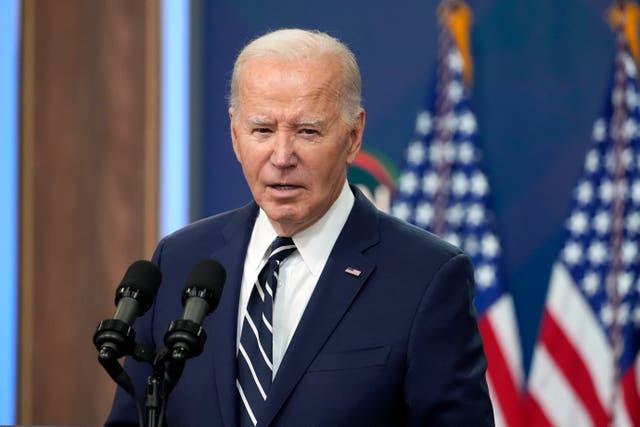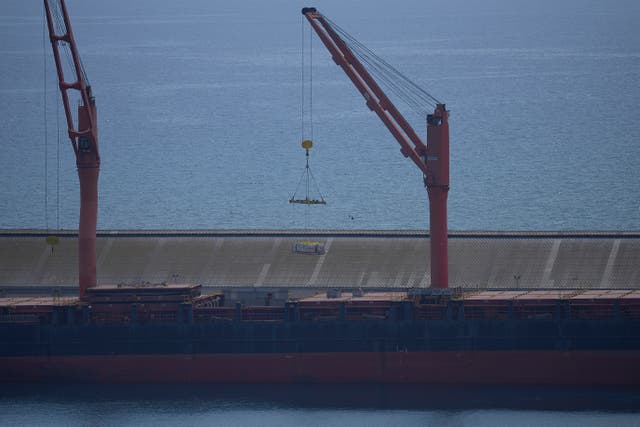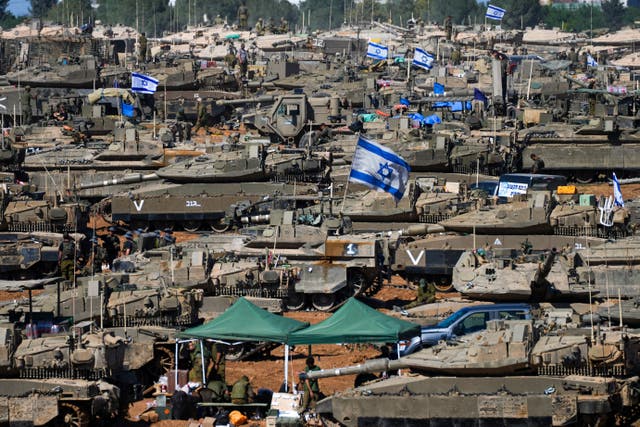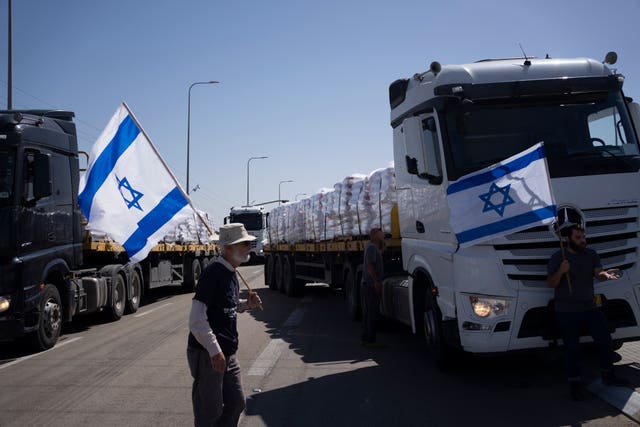
James O'Brien 10am - 1pm
9 May 2024, 19:24

The Israeli Prime Minister has repeatedly vowed to invade Rafah despite widespread international opposition.
Israeli Prime Minister Benjamin Netanyahu has said his country will “stand alone” if it has to in its war against Hamas – threatening to deepen a crisis in relations with the United States.
Mr Netanyahu spoke after President Joe Biden said the United States would not provide offensive weapons for Israel’s long-promised assault on the southern Gaza city of Rafah.
Israel says that Rafah is Hamas’s last stronghold in Gaza, and Mr Netanyahu has repeatedly vowed to invade the city despite widespread international opposition due to concerns over the more than one million Palestinian civilians huddled in the city.
“If we have to stand alone, we will stand alone,” he said. “If we need to, we will fight with our fingernails. But we have much more than fingernails.”

Mr Biden’s comments about providing weapons were the latest sign of steadily deteriorating relations between Israel and its closest and most important ally after seven months of Israel’s war against Hamas.
The threat of losing a key flow of arms has raised questions about Israel’s ability to continue the war.
Earlier this week, it moved into Rafah’s eastern outskirts and seized control of a key border crossing.
Asked whether Israel could press ahead without American arms, the army’s spokesman, Rear Admiral Daniel Hagari, said Israel already has the weapons it needs for the Rafah operation.
“The army has munitions for the missions it plans, and for the missions in Rafah too – we have what we need,” he said.
He said relations with the US remain close and said Israel appreciates American assistance and that disagreements should be resolved behind closed doors.

Israel’s initial push into Rafah, along with Hamas attacks on Israel’s Kerem Shalom crossing, have disrupted the flow of aid into Gaza and raised new concerns about worsening the territory’s already dire humanitarian situation.
On Thursday, the first aid ship bound for an American-built floating pier to be installed in Gaza departed. But it is unclear when the corridor will be up and running, and humanitarian groups say there are still major obstacles to getting food to starving Palestinians in the war-ravaged enclave.
Cyprus announced the ship’s departure even though the US military has not yet installed the pier and questions remain as to how the aid will be distributed.
Even when the route is up and running, it will not be able to handle as much aid as Gaza’s two main land crossings, which are currently inaccessible.
The UN says most of the territory’s 2.3 million Palestinians suffer from hunger and that northern Gaza is already experiencing “full-blown famine”.
Humanitarian workers fear an even more dire situation if Israel launches its long-promised invasion of the southern city of Rafah, which is the main distribution point for aid and where some 1.3 million Palestinians have sought refuge, most having fled from fighting elsewhere.

Israel seized the Gaza side of the Rafah crossing with Egypt on Tuesday, and it is unclear when it will reopen.
Israel reopened its side of the nearby Kerem Shalom crossing – Gaza’s main cargo terminal – after a rocket attack over the weekend, but the UN’s main provider of humanitarian assistance says aid cannot be brought in on the Palestinian side because of the security situation.
A recently reopened route in the north is still functioning, but only 60 trucks entered on Tuesday, far below the 500 that entered Gaza each day before the war.
International aid groups warned this week that a distribution network is at risk of collapse across the territory because of the closure of Rafah, which was used to import fuel. The UN agency for Palestinian refugees said it only has enough stocks to maintain operations for a few days and has started rationing.
The threat of a full-scale invasion of Rafah, where many aid groups have warehouses and staff, is also disrupting distribution.
Mr Biden said on Wednesday that the US would not supply offensive weapons for an all-out invasion, in the latest escalation of tensions between the two close allies.
Earlier, Israel’s far-right national security minister, Itamar Ben-Gvir, wrote a post on the platform X with a heart between the words “Hamas” and “Biden”. He and other ultra-nationalist members of Mr Netanyahu’s coalition support a large-scale Rafah operation and have threatened to bring down his government if it does not happen.

Israel’s limited military incursion into Rafah has meanwhile already complicated what had been months of efforts by the US, Qatar and Egypt to broker a ceasefire and the release of hostages captured in Hamas’s October 7 attack that triggered the war.
CIA director William Burns headed back to the US as planned on Thursday after attending talks in Cairo and meeting Mr Netanyahu this week, a US official said.
Hamas also said its delegation had left Cairo and was returning to Qatar, where it maintains a political office.
Egypt’s state-owned Al-Qahera TV said that the Cairo negotiations were continuing. It did not say whether Israel’s delegation was still there, and there was no comment from the Israeli government.
The war began with Hamas’s surprise attack into southern Israel, in which it killed some 1,200 people, mostly civilians, and took another 250 hostage. The militants are still holding some 100 captives and the remains of more than 30 after most of the rest were released during a ceasefire last year.
The war has killed more than 34,800 Palestinians, mostly women and children, according to the Gaza Health Ministry.
Israel’s offensive, waged with US-supplied munitions, has caused widespread devastation and forced some 80% of Gaza’s population to flee their homes.
Mr Biden announced the construction of the floating pier two months ago as part of efforts to ramp up humanitarian aid to Gaza.
Major Pete Nguyen, a Pentagon spokesman, said on Thursday that parts of the pier are still in the Israeli port of Ashdod awaiting more favourable seas before being moved into position off Gaza. He said the US vessel Sagamore, which left Cyprus, would transport aid to another ship which is off the coast of Gaza.
“In the coming days, the US will commence an international community-backed effort to expand the delivery of humanitarian assistance to the people of Gaza using a floating pier,” he said.